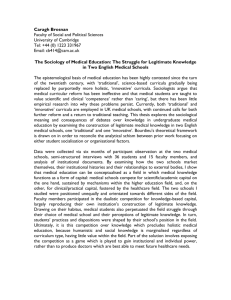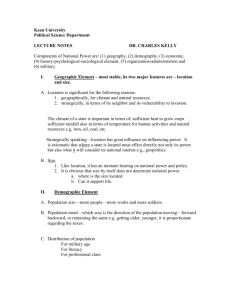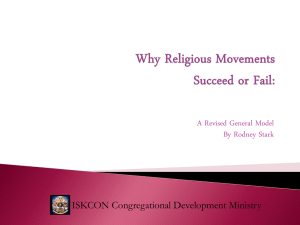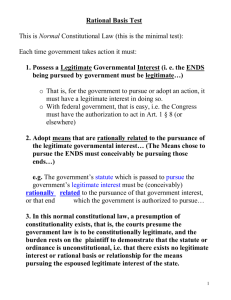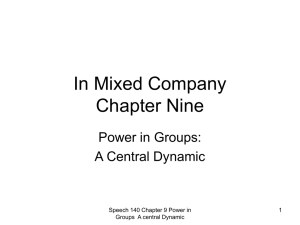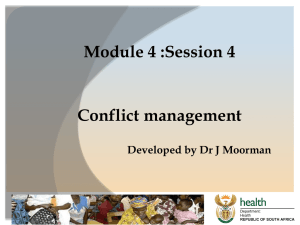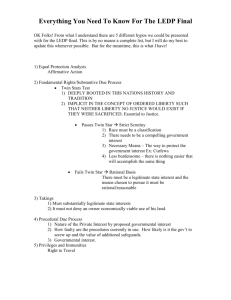JUDGMENT NO. 335 YEAR 2009 In this case the Court considered
advertisement
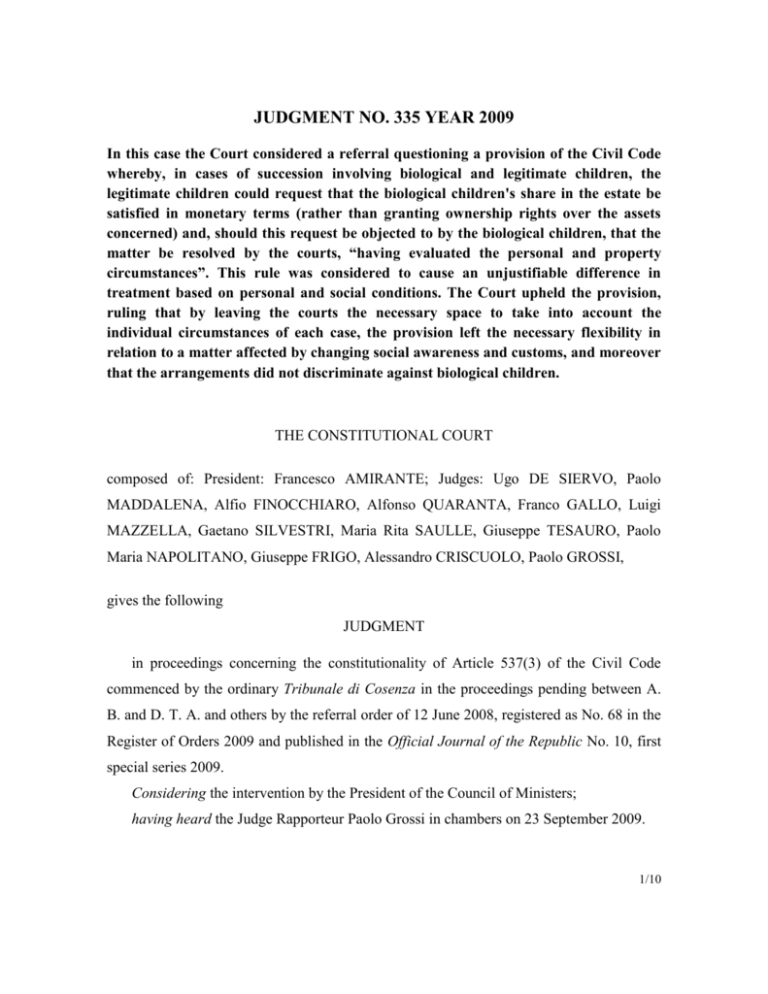
JUDGMENT NO. 335 YEAR 2009 In this case the Court considered a referral questioning a provision of the Civil Code whereby, in cases of succession involving biological and legitimate children, the legitimate children could request that the biological children's share in the estate be satisfied in monetary terms (rather than granting ownership rights over the assets concerned) and, should this request be objected to by the biological children, that the matter be resolved by the courts, “having evaluated the personal and property circumstances”. This rule was considered to cause an unjustifiable difference in treatment based on personal and social conditions. The Court upheld the provision, ruling that by leaving the courts the necessary space to take into account the individual circumstances of each case, the provision left the necessary flexibility in relation to a matter affected by changing social awareness and customs, and moreover that the arrangements did not discriminate against biological children. THE CONSTITUTIONAL COURT composed of: President: Francesco AMIRANTE; Judges: Ugo DE SIERVO, Paolo MADDALENA, Alfio FINOCCHIARO, Alfonso QUARANTA, Franco GALLO, Luigi MAZZELLA, Gaetano SILVESTRI, Maria Rita SAULLE, Giuseppe TESAURO, Paolo Maria NAPOLITANO, Giuseppe FRIGO, Alessandro CRISCUOLO, Paolo GROSSI, gives the following JUDGMENT in proceedings concerning the constitutionality of Article 537(3) of the Civil Code commenced by the ordinary Tribunale di Cosenza in the proceedings pending between A. B. and D. T. A. and others by the referral order of 12 June 2008, registered as No. 68 in the Register of Orders 2009 and published in the Official Journal of the Republic No. 10, first special series 2009. Considering the intervention by the President of the Council of Ministers; having heard the Judge Rapporteur Paolo Grossi in chambers on 23 September 2009. 1/10 The facts of the case 1. – During the course of a civil dispute – initiated by the plaintiff against the heirs of the deceased (who died intestate), seeking to obtain an acknowledgement of paternity and confirmation of her rights over the estate and the resulting division – the ordinary Tribunale di Cosenza raised by referral order of 12 June 2008, with reference to Articles 3 and 30(3) of the Constitution, a question concerning the constitutionality of Article 537(3) of the Civil Code, which provides that “Legitimate children may satisfy the share due to biological children in money or immovable assets from the estate provided that the latter do not object. In the event that an objection is lodged the matter shall be resolved by the courts, having evaluated the personal and property circumstances”. The referring court states with regard to the facts of the case that – following definitive confirmation of the partial judgment by which paternity was established – pursuant to an application for division of the estate, the defendant legitimate children requested the liquidation in money terms of the portion due to the biological daughter who was a joint heir with ownership rights over the estate; however, the latter opposed this request, asking that a question be referred concerning the constitutionality of the provision. With regard to the relevance of the case, the lower court asserts that – due to the plaintiffs' opposition – “it should rule having evaluated the pecuniary and personal circumstances” whilst, were that rule not to exist, “were the biological child to object, the court could not under any circumstances permit the conversion of the share into money, since the estate concerned is comprised of various immoveable properties”. With regard to the question of non manifest groundlessness, the referring court observes that the contested provision was introduced by law No. 151 of 19 May 1975 (Reform of family law), which repealed – in order to comply with the requirements of Article 30(3) of the Constitution – the old provision contained in Article 574 of the Civil Code, according to which legitimate children had the discretionary right to dissolve the estate in co-ownership with biological children, transforming the share of inheritance [of 2/10 the latter] into a sum of money, with no right of opposition by the biological child with a judicial assessment of the circumstances of the specific case. However, according to the lower court, the position of biological children has changed over the course of the years, precisely following the introduction of the law reforming family law, and subsequently the laws on separation and divorce, with the result that the rationale underlying the provision under examination – consisting in the need to render the protection of biological children compatible with the rights of the members of the legitimate family, albeit through the corrective mechanism of opposition with deferral of the decision to the courts – has become anachronistic. Currently in fact, “in addition the fact that it no longer arouses any kind of feeling of 'being an outsider' to the family, the figure of the biological child is somewhat widespread”, since “the number of separations is very high and, in the majority of cases, one or both of the married couple start a new cohabiting relationship, leading to the birth of biological children (at times recognised through a subsequent marriage)”, who present themselves to the community at large as heirs, and so it can no longer be asserted that the legitimate child is the “witness” of the family identity. In the opinion of the referring court, to permit the assessment mentioned (which according to the provision must also consider the pecuniary circumstances of the children concerned) to be carried out by the courts discriminates unjustifiably against the biological child, and does not guarantee his or her rights. Moreover, the different treatment reserved to biological children upon division of the estate, which is not justified by any requirement to protect the rights of legitimate children (which in any case, for the lower court, would not be infringed in the event that the provision were repealed), contrasts with the prohibition on differences in treatment based on personal and social conditions. On the other hand, the referring court concludes, the elimination of the provision from our legal system would not entail any incompatibility with the protection of the legitimate family given that, in the event of agreement, the legitimate children could always consent to the liquidation of their share as money or immoveable property (as occurs today where 3/10 more than one legitimate child has inheritance rights) and, in the event of disagreement, no detriment would in any case caused to the share of any of the descendants. 2. – The President of the Council of Ministers intervened in the proceedings, represented and advised by the Avvocatura Generale dello Stato, arguing that the question raised was groundless. The state representative points out that the rationale for the contested provision lies in the different relationship which de facto exists between legitimate and biological children and between these and the family assets; therefore, it appears reasonable to grant legitimate children the power to transform the share in the estate of biological children into money, thereby allowing the assets in the estate to remain with those who normally have a particular emotional tie with the said assets. On the other hand (the Avvocatura Generale continues), the contested provision recognises the legal equality of legitimate and biological children, since it also guarantees the latter a share in the estate of equal value, providing for a possible diversification in the share of the inheritance due to the biological children only on a qualitative basis and not in quantitative terms. Besides, the right to transformation is not absolute since the biological children may object to it and bring the matter before the courts, which must decide taking into account their personal and property situation. Conclusions on points of law 1. – The ordinary Tribunale di Cosenza challenges Article 537(3) of the Civil Code, which provides that “Legitimate children may satisfy the share due to biological children in money or immovable assets from the estate provided that the latter do not object. In the event that an objection is lodged the matter shall be resolved by the courts, having evaluated the personal and property circumstances”. According to the referring court, the provision violates: a) Article 30(3) of the Constitution, since to permit the assessment mentioned (which according to the provision must also consider the pecuniary circumstances of the children concerned) to be carried out 4/10 by the courts unjustifiably discriminates against biological children, and does not guarantee their rights; b) Article 3 of the Constitution, since the different treatment reserved to biological children upon division of the estate, which is not justified by any need to protect the rights of the legitimate children (which in any case, according to the lower court, would not suffer any detriment in the event that the provision were repealed), violates the prohibition on discrimination based on personal and social conditions. 2. – The question is groundless. 2.1. – Article 30(3) of the Constitution expressly provides that: “The law shall ensure full legal and social protection to children born out of wedlock insofar as compatible with the rights of the members of the legitimate family”. This Court has specifically explained the twofold normative meaning conferred under its own case law on the constitutional principle under examination which, with regard to relations between parents and children, manifests itself as a rule stipulating that the status of the biological child (as acknowledged or declared) be considered equivalent to the status of the legitimate child, insofar as compatible with the rights of the members of the legitimate family based on marriage; on the other hand, with regard to the relations of the biological child with his or her parent's relatives (namely with the family of origin of the parent and with his or her other acknowledged children, whether legitimate or biological), it operates as a provision inspiring a rule that increasingly more appropriate protection be conferred on the status of biological children under family law (judgments No. 377 of 1994 and No. 184 of 1990). Consequently, the Court has also clarified “that it is not necessary under constitutional law that Article 30 of the Constitution have the result that biological relatives be considered equal to legitimate relatives”, since “a broad concept of 'biological kinship' has not been endorsed under constitutional law, which is limited to making provision for biological children and establishing their equal treatment with legitimate children, albeit subject to the compatibility proviso” (judgment No. 532 of 2000). 2.2. – Within the specific context of relations between the biological child and the members of the legitimate family (and, in particular, insofar as is of interest here, the legitimate children), it is precisely the criterion of compatibility mentioned above which 5/10 represents the fulcrum of the constitutional system directed at settling the rights in play, which must occur against the backdrop (not of discrimination against the position of one compared to those of others, but rather) of recognition of the diversity of the positions under examination. This diversity in equal treatment may hence be grasped immediately from a simple consideration of the fact that, “as occurs in the vast majority of legal systems today”, Article 30(1) and (3) of the Constitution recognises “only two categories of children: those born within wedlock and those born outwith wedlock, without any further distinction between the latter” (judgment no. 494 of 2002). Therefore, the approach to the issue relating to the correctness of the choice of specific procedure for achieving the aforementioned reconciliation with (or subordination to) other principles of equal or greater weight is to be carried out entirely with reference to the analysis of the reasonableness of the differentiated treatment, measured against “the evolving dynamics of social relations” (judgment No. 377 of 1994). 2.3. – In addition to establishing and regulating the right to transformation under examination (sub-section three), Article 537 of the Civil Code (as replaced by Article 173 of Law no. 151 of 19 May 1975) provides that, in the event that both legitimate and biological children have rights under the inheritance, both shall be granted the same inheritance rights in equal measure (sub-sections one and two). Therefore – in radically amending the previous provisions of Article 541 of the Civil Code (repealed by Article 177, also of law No. 151 of 1975) – the framers of the family law reform considered the inheritance rights of legitimate and biological children as equivalent, at the same time reformulating the aforementioned right to transformation (which relates to the stage in which the estate is divided), turning it from an unchallengeable and merely discretionary right granted to the legitimate children to a right the exercise of which is controlled in detail, since it is subject to the twofold prerequisite of the lack of opposition from the biological child and a decision by the courts, “having assessed the personal and property circumstances”. It is important to point out that – even though it was called upon to review the constitutionality of the repealed Article 541 of the Civil Code – the Court has already has 6/10 the opportunity to assert that the provision contested in this case (which in the previous case was adopted as a comparator in support of the alleged unconstitutionality of the previous legislation) exists against the backdrop of the gradual adaptation of the law in line with the spirit of evolution resulting from the constitutional principle contained in Article 30(3) which permeates the reform of family law and characterises (and directs) the broad discretion left to Parliament in such matters; however, in addition to the requirement to comply with the principle of reasonableness reconciled with the evolving dynamic of social relations, this discretion is also subject to the limit, laid down by the same constitutional provision, that it be compatible with the rights of the members of the legitimate family (judgment No. 168 of 1984). Nevertheless, these considerations offer references that are significant and still current, including in the light of subsequent case law. First and foremost, as regards the conferral of jurisdiction “on the ordinary courts – given the generic formulation of the text of Article 30(3) resulting from the 'painstaking process that led to its definitive formulation in the Constituent Assembly' (judgment No. 54 of 1960) – to act as the attentive interpreter of the evolution of customs and social awareness and, consequently, with regard to the requirement expressly laid down by the constitutional principle that the protection for children born out of wedlock be “compatible” with the rights of the members of the legitimate family, to provide solutions that may also differ over time, in harmony with the aforementioned evolution”. Secondly, as regards the recognition of the fact that “starting from the awareness that 'no part of the legal system feels the simultaneous and opposing influences of tradition on the one hand and evolving customs on the other as family law does', Parliament [in 1975] sought to commit 'wisdom and balance' with a view to 'reconciling the delicate inter-relations and the intensity of the forms of protection of the different interests in play … in order to improve the legislative treatment of the institute and above all to ensure that it reflects the social reality'” (judgment No. 168 of 1984). 2.4. – Therefore, although the complete equivalence in quantitative terms of the inheritance rights of legitimate and biological children, established under the first two subparagraphs of Article 537 of the Civil Code, implements (in a manner that is certainly 7/10 mandatory) the principle of the necessary equality of the children's positions with regard to the deceased parent (who died intestate), Parliament's choice in granting legitimate children the right to request transformation, subject to the provision stipulating a right of opposition by the biological child and an evaluation of the specific circumstances underlying the court's decision, does not contradict the aforementioned aspiration that the positions of biological children should be treated as equivalent. This means that it is not unreasonable to assert that it still today operates (as an option that is neither required nor prohibited under constitutional law) as a mechanism for balancing (compatibility) the rights of the biological child against those of the children who are members of the legitimate family. The express reference by the Constitution to the criterion of “compatibility” operates as a genuine general clause that is open to changes in society and customs. It is precisely from this perspective that the framers of the family law reform took action, conferring upon the courts – which are ultimately charged with the task of determining whether or not that which may essentially be defined as “justified grounds” for opposition by the biological child to the request for transformation made by the legitimate children can be considered to subsist – the role of the guarantor of equal treatment in diversity through the ongoing adaptation to constitutional principles of the specific application of the provision. The fact that the court by nature rules on a case by case basis (which, where necessary under the circumstances, may obviously favour the biological child) in fact permits individual decisions to be tailored to specific personal circumstances (relating to prior relations between the children) and the circumstances of the assets (relating to the situation of the assets left as inheritance, taking account both of their best conservation and administration, as well as the relationship binding the heir to the asset) circumstances, thereby avoiding possibly arbitrary exercises – which accordingly do not deserve concrete protection – of the right to transformation or the right to oppose it. Besides, the (intentionally) elastic linguistic formulation used by Parliament is teleologically consistent with the system, since it leaves all due space to the discretionary assessment of the court (the decisions of which are moreover subject to the normal procedural remedies, just as any other decision). 8/10 Therefore, far from being anachronistic (as the referring court argues) the rationale underlying the provision under examination appears on the other hand capable (from time to time, and depending on the 'spirit of the age') of permitting account to be taken of individual circumstances, tailored precisely in line with that evolutionary dynamic of social relations implementing the constitutional principle – also due to its “open” formulation (similar to that provided for under Article 252 of the Civil Code on the custody of minor children and their incorporation into the legitimate family). This is all the more so the case since – in order to give substance to the broad scope already noted above of the reference in the legislation to “personal and property circumstances” – when interpreting the provision, the courts are required to give a constitutionally informed interpretation, which cannot disregard (but must necessarily take into account) the natural evolution over time of social awareness and customs. 2.5. – Therefore, the contested provision is not affected by the contested grounds for unconstitutionality. ON THOSE GROUNDS THE CONSTITUTIONAL COURT rules that the question concerning the constitutionality of Article 537(3) of the Civil Code, raised with reference to Articles 3 and 30(3) of the Constitution by the ordinary Tribunale di Cosenza by the referral order mentioned in the headnote, is groundless. Decided in Rome, at the seat of the Constitutional Court, Palazzo della Consulta, on 14 December 2009. Signed: Francesco AMIRANTE, President Paolo GROSSI, Author of the Judgment 9/10 Giuseppe DI PAOLA, Registrar Filed in the Court Registry on 18 December 2009. The Director of the Registry Signed: DI PAOLA 10/10
